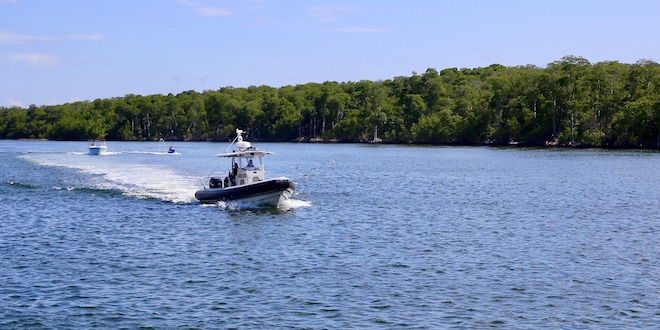Boating on our waterways is a favorite pastime of residents and visitors to South Florida, but it can quickly become dangerous if you do not follow marine rules and regulations. Our Sunny Isles Beach Marine Patrol enforces maritime laws to ensure the safety of all on the waterways. If you are new to boating, we recommend you take a course to help improve your boating knowledge and skills. There are many courses available online.
There are many federal and state requirements for all boats, and all owners/operators must know these regulations and comply with them before hitting the water. Even if you are just a passenger, you should be familiar with the regulations that pertain to your safety before you get on the boat. Here are a few requirements that are critical to everyone’s safety.
Rules & Regulations
For a complete list of Florida’s boating rules and regulations, please visit myfwc.com/boating/regulations.
There is no minimum age to operate a boat. However, the personal watercraft (jet ski) regulations and boating safety requirements below are age specific and would apply.
If you were born on or after January 1, 1988, you must obtain the Florida Boating Safety Education I.D. Card to operate any powered watercraft with more than 10 horsepower, including personal watercraft, or PWC. The online Boat Florida Course features clear boating safety instructions and detailed graphics that help you improve your boating skills. You must be a resident of Florida to take this course.
- The boat must be registered and the numbers properly displayed.
- There must be at least one Personal Flotation Device (PFD) in good condition for each person on the boat. If there are children, make sure there is a PFD that fits each child. All PFDs must be Coast Guard-approved, easily accessible and not locked in a compartment.
- Fire extinguishers must be aboard the boat and number and size of extinguishers are determined by the size of the vessel.
- Navigation lights must be present and operational.
- A Sound Producing Device or bell must be onboard.
- Overall vessel condition must be good.
- Not required, but a really good idea to have on the vessel is a marine radio and a well-stocked first-aid kit.
- Motorized and self-propelled watercraft are not allowed to launch from the beach.
- Motorized and self-propelled watercraft are not allowed in the swim zone (designated area between shoreline and buoys).
- Boaters must observe all manatee protection zone requirements.
- Except in the event of an emergency, it is unlawful to moor or fasten to any lawfully placed navigation aid or regulatory maker.
Compliance with safety requirements is actually only a minimum standard and a starting point for avoiding tragedy. A big part of safe boating depends on the actions and behavior of all aboard the vessel. Responsible boating also includes the following precautions:
- Maintain a safe speed and obey all posted signage and rules of navigation.
- Excessive use of alcohol should be avoided and there should be a “designated operator” who does not consume alcohol at all.
- Keep an eye out for changing weather conditions and respond accordingly.
- Make sure someone on land knows your “float plan” or the general area you plan to navigate.
- Scan the water in all directions on a regular basis for hazardous situations.
- Children under 6 years of age must wear an approved lifeguard jacket at all times while on any vessel less than 26 feet in length that is underway upon Florida waters. Life jackets must be used in accordance with the USCG approval label.
- Channel 16 is designated as the national distress, safety and calling frequency.
All boat owners should consider having a Vessel Safety Check. This is a free check conducted by the local Coast Guard Auxiliary for boaters who wish to make sure that their vessel meets all federal and local safety requirements.
The Vessel Safety Check is not a law enforcement issue and no citations are given for any discrepancies. The examiner will make note of the current condition of the vessel and offer suggestions and tips for safety improvements.
For details on the Vessel Safety Check and information on local or online Boating Education Courses visit uscgboating.org.
 City of Sunny Isles Beach Official Website
City of Sunny Isles Beach Official Website
